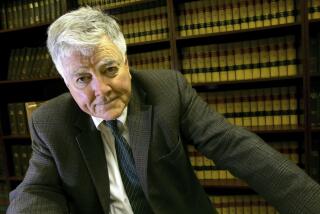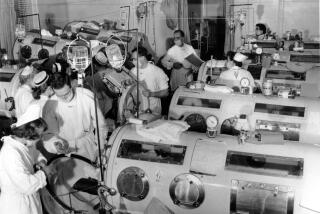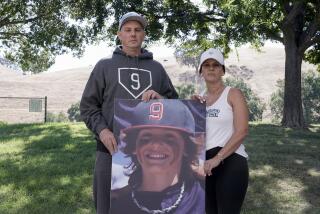From the Archives: Benjamin Spock, Baby Doctor for the Millions Dies
- Share via
Dr. Benjamin Spock, the pediatrician whose practical book “Baby and Child Care” became the bible of American parents for two generations and whose opposition to the Vietnam War made him one of the most controversial figures of the 1960s and 1970s, has died, it was reported Monday.
Spock was 94 when he died Sunday in his San Diego home, said his physician, Dr. Stephen Pauker. There was no specific cause of death reported, but in recent years, Spock had suffered a heart attack, a stroke and several bouts of pneumonia. Just last month, his wife was publicly asking for money from friends and family to help pay his $10,000-a-month medical bills.
Spock won fame and fortune with his book, first published in 1946, which sold nearly 50 million copies in 30 languages and became the No. 2 best-selling book in America, with only the Bible outpacing it. It told parents: “Trust yourself . . . you know more than you think you do.”
“He was really the first person to talk about listening to children, which is such a catch phrase now,” British psychologist Penelope Leach, author of the best-selling “Baby and Child,” said from her London office.
Growing Activism
After winning the gratitude of parents, Spock turned to political activism and its concomitant controversy. He opposed nuclear weapons and led anti-Vietnam War campaigns, and became a fixture at demonstrations and the target of attacks from such conservatives as the Rev. Norman Vincent Peale and Vice President Spiro Agnew.
Agnew labeled Spock’s book “permissive,” and by extension blamed Spock for the antiwar feelings of many college students of the 1960s who were brought up under the doctor’s guidelines.
The pediatrician, who got nowhere with a presidential campaign in 1972, denied the charge and insisted on his right to oppose America’s involvement in Southeast Asia.
“What is the use of physicians like myself trying to help parents to bring up children healthy and happy, to have them killed in such numbers for a cause that is ignoble?” he asked at the time.
As for the criticism aimed at his book, Spock attributed much of this to the politics of the time.
“What criticism came in the later years was because of my politics,” he told an interviewer in 1984. “People are delighted to have a scapegoat, and that’s what Peale was trying to do.”
“The person who spread the accusation most widely was Spiro Agnew, who turned out to be a common crook. He went all over the country saying I was responsible for raising the hippies and draft resisters. I was always glad to say that no one could accuse me of raising Spiro Agnew.”
The criticism had some effect on people who misunderstood his basic philosophy, Spock added.
“A lot of Americans still think that my advice is to let children do anything, that it’s all right to let them act uncooperatively or impolitely.”
But people who thought that never read his book, Spock said. “Right from the start, the book said, give your children firm, clear leadership, ask them for politeness and cooperation. Respect your children, but ask them for respect also. There was nothing in it about giving children anything they want.”
One of the reasons for Spock’s overwhelming success was that at the time he first wrote, other baby doctors were ignoring behavior questions--temper tantrums, bed-wetting and the like.
“Pediatric residents prided themselves on identifying rare diseases,” he said much later. “But in practice they would go years without seeing anything unusual. In the meantime, they had no training in helping parents deal with behavioral problems.”
In 1944, Spock had begun a two-year stint as a psychiatrist in Navy hospitals. He spent his evenings during those war years writing “Baby and Child Care” and was discharged in 1946 with the rank of lieutenant commander and a book manuscript.
The book was revolutionary. It came at a time when the standard baby care book in this country was Dr. John B. Watson’s “Psychological Care of Infant and Child,” first published in 1928. Watson’s book advised parents toward rigidity and fear in raising children, saying, typically: “Never, never kiss your child. Never hold it on your lap. Never rock its carriage.”
Watson’s work was sadly out of date—even by the standards of several decades ago—and Spock saw a need to replace it.
“The literature for parents simply hadn’t caught up,” he said in 1981. “It was from the dark ages.”
Spock said his book was written “to be supportive of parents rather than to scold them. Instead of just telling a parent what to do, I usually tried to explain what children are like at different stages of development, what their drives are, so that the parent would know what to expect and could act on his own knowledge.
“The book set out very deliberately to counteract some of the rigidities of pediatric tradition. . . . It emphasized the importance of the great differences between individual babies, of the need for flexibility and of the lack of necessity to worry constantly about spoiling.”
Benjamin McLaine Spock was born May 2, 1903, in New Haven, Conn., the oldest of six children of Benjamin Ives Spock, a corporate lawyer, and Mildred Spock, a strong-willed, ironhanded woman.
The man who was to revolutionize child-raising with his advocacy of a relaxed attitude was brought up by a mother who was anything but relaxed.
“As a matter of principle, my mother made us feel insecure,” Spock said in a 1981 interview. “Her way of automatically controlling us was to make us feel we were bad. In my mother, this was so extreme that when I visited a friend’s house and the mother complimented my mother on my good behavior, she would say to me, ‘That just goes to show how insincere you are. You pretend to be good when you are at someone else’s house while you are such a bad boy at home.’ ”
Spock was educated at private schools in Connecticut and Massachusetts and then went on to Yale, where he was an oarsman on the university’s crew that won a gold medal at the 1924 Olympics in Paris.
A Struggling Practice
Spock at first thought he wanted to be an architect, but changed his mind after spending a summer at a camp for disabled children in Connecticut. “I watched the orthopedic surgeon working with the children who had polio,” he said in an early interview. “I realized how much he was helping them and I decided that I wanted to be a doctor.”
Spock started out at Yale’s medical school, then switched to Columbia for his degree, with internships and residencies in pediatrics and psychiatry at hospitals in New York City.
In the 1930s and 1940s, Spock—besides maintaining a private practice—taught at Cornell University’s medical school, was a staff physician at New York Hospital and served as a consultant in pediatric psychiatry to the New York City Department of Health.
Initially, Spock’s private practice was nearly a failure. “It was the Depression and New Yorkers didn’t need more pediatricians,” he said later. “It took me three years before I earned as much as $100 a month gross.”
World War II helped Spock survive. “I was deferred a long time. As other pediatricians were drafted, they handed over their patients to me.” His popularity and his practice grew quickly in the early 1940s. Another physician remembered, “I used to hear parents and even doctors talk about him as ‘the man with the gentle face and eyes.’ He welcomed house calls.”
The genesis of the book that was to make him a household word came from Pocket Books, the paperback publishers. They told him “not to worry about making the book too good; after all, it would sell for only 25 cents,” he said.
But Spock made it good. His wife at the time, Jane, typed it from Spock’s handwritten and dictated work, and the pediatrician even insisted to his publishers that he do the index himself rather than turn it over to others. “I knew I would have a better notion of what words mothers would look for in an index,” he said. Spock was right; harried mothers found the 1,500-word index—everything from abscess to zwieback—particularly helpful.
Originally titled “The Common Sense Book of Baby and Child Care,” Spock’s work was an immediate success. It was revised four times—once every decade—to include medical advances, to cover new problems like television viewing and to reflect changing societal views.
For instance, the 1976 revision attempted to rid the book of sexism. The pronoun for baby was changed from he to she.
In 1988 Spock wrote “Dr. Spock on Parenting: Sensible Advice From America’s Most Trusted Child Care Expert,” and in 1989, with his second wife, Mary Morgan, wrote “Spock on Spock: A Memoir of Growing Up With the Century.”
Changing Politics
Spock left New York in 1947 for jobs teaching psychiatry at the University of Minnesota in Minneapolis and consulting for the Mayo Clinic. He was professor of child development at the University of Pittsburgh from 1951 to 1955, then assumed the same post at Cleveland’s Case Western Reserve University, where he stayed until his formal retirement in 1967.
During those years, the doctor’s politics were conventionally liberal. He had started out as a Republican, obeying his conservative father, then became a fan of Franklin D. Roosevelt’s New Deal. Politics were, at most, a peripheral matter to him.
That changed in 1962, when Spock, a supporter of John F. Kennedy, was angered by the president’s resumption of nuclear testing in the atmosphere.
“Kennedy said the United States had to resume testing to stay ahead and, obviously, you can’t stop testing if you’re behind,” Spock said later. “It seemed clear that the buildup would continue until there was a nuclear war or a nuclear accident.”
Spock joined the board of the National Committee for a Sane Nuclear Policy and lent his name to a full-page advertisement in the New York Times titled “Dr. Spock Is Worried.” The ad warned of the radioactive contamination of milk from nuclear testing in the atmosphere and the effects of contamination on children.
The pediatrician supported President Lyndon B. Johnson’s campaign against Barry Goldwater in 1964 but in 1965 found himself “betrayed and outraged” when Johnson escalated U.S. military involvement in Vietnam.
At first, Spock’s protest took the form of letters to the White House asking Johnson to remember his campaign promises. When that failed, Spock joined an increasingly aggressive antiwar protest movement in the streets.
A tall man at 6 feet, 4 inches and invariably dressed in a three-piece suit, Spock was an impressive sight at the head of the rallies staged in New York and Washington by the National Mobilization Committee to End the War in Vietnam.
His increasing activity in the antiwar movement led inevitably to peaceful confrontations with the law. The first time was in December 1967, when officers arrested Spock for crossing a police line in an act of civil disobedience at a Manhattan draft induction center. It was, he said later, humiliating at first, but then became something of a liberating experience.
He called the act of demonstrating “excruciatingly embarrassing, like one of those bad dreams where suddenly you are downtown without any clothes on.”
“I was raised so properly—I never even went out on Halloween. I was scared of everything—all forms of authority, my parents foremost, my teachers, policemen, bullies, even barking dogs. When the policeman advanced to arrest me, the first thought to cross my mind was, ‘What would Mother think?’ ”
A bit later, the pediatrician was arrested in Washington with 150 clergymen during an antiwar demonstration in the Capitol rotunda, an experience he found far from unpleasant.
“If you ever decide to be arrested,” he said, “try to do it in the company of clergymen. It makes you feel not so bad, somehow.”
Spock said he and the jailed clergymen stayed awake until 3 a.m., singing in their cells. “I’ll never forget how much they enjoyed their first experience being bad boys.”
The U.S. Justice Department moved against Spock and four other members of the loosely knit draft resistance movement in late 1967, charging them with conspiracy to aid and abet violation of the Selective Service Act. The defendants were tried in federal court in Boston in 1968. Spock was convicted and sentenced to two years in prison, but the decision was overturned by an appeals court whose members ruled the trial judge had improperly instructed Spock’s jury, making a fair trial impossible.
Spock ran for President in 1972 as a candidate for a group called the People’s Party, whose platform called for immediate withdrawal of all American troops abroad, not just Vietnam. His name was on the ballot in only 10 states and the doctor received only 78,801 votes.
After the reelection of Richard M. Nixon that year and the subsequent American disengagement from Vietnam, Spock continued his lecture appearances, arguing against further nuclear buildups, and worked on behalf of left-wing organizations. In 1975, Spock became a member of the Bertrand Russell Tribunal, a group that met to denounce violations of human rights in Latin America and other areas of the world.
But with the end of the war, Spock lost his cause and his political prominence. He also seemed to lose some of his optimism about the generation or two that had been raised by the book—Spock’s book.
“The remarkable thing is that after American troops were withdrawn, all protests disappeared rapidly,” he told an interviewer in 1984. “I was rather disappointed. I had the idea that young people had got hold of some fundamental truths—such as the hollowness of materialistic society.”
“They used to say things like why do we have to get into this dog-eat-dog competitiveness in America? Why don’t we work cooperatively? Why do we have to strive so hard to get money and goods? Why don’t we see how simply we can live?”
“I thought these were wonderful ideas, and that the young, having discovered them, would go on with them, and that it would be passed down to succeeding generations. But it certainly was not.”
Spock’s later years were spent in quasi-retirement. He chose Dr. Michael Rothenberg as his successor of sorts; they collaborated on the latest revision, in 1985, of “Baby and Child Care.” The athletic-looking Spock lived in Maine and the hills of Arkansas, wintered in the Caribbean, and continued his passion for sailing and rowing in all three places.
Spock had two sons with his first wife, Jane. After they divorced, he married Morgan, West Coast feminist 40 years his junior, in 1976.
He was looser and happier in his later years—Spock had long since given up three-piece suits for bluejeans and sport shirts.
His main concern in terms of raising children seemed to be his seven grandchildren and problems with his stepdaughter—”The child was 11 when I married her mother, and she wouldn’t speak to me or look at me for three years.”
He also seemed to be at peace with himself.
“I don’t believe I go up to heaven and look down through a peephole to see how I’ve done,” he said in a 1985 interview with The Times. “But I know that I can help create an afterlife by influencing those who will come after me.’
AUTHOR AND ACTIVIST
Background: Educated at private schools; at Yale, was an oarsman on crew that won a gold metal at 1924 Olympics.
Medical training: Earned medical degree from Columbia and did internships and residencies in pediatrics and psychiatry at hospitals in New York City.
Bestsellar: “Book of Baby and Child Care,” first published in 1946, has sold nearly 50 million copies in 30 languages and is America’s No. 2 best seller, exceeded only by the Bible.
Politics: In the 1960s, Spock turned to political activism, opposing nuclear weapons and leading anti-Vietnam-war campaigns; got with presidential run in 1972.
From the Archives: Pioneering Photographer, Filmmaker Gordon Parks Dies
From the Archives: Andy Warhol, Pioneer of ‘60s Pop Art, Dies
From the Archives: Jazz Great Thelonious Monk Dies
From the Archives: Princess Margaret, 71; Sister of the Queen
More to Read
Start your day right
Sign up for Essential California for the L.A. Times biggest news, features and recommendations in your inbox six days a week.
You may occasionally receive promotional content from the Los Angeles Times.







